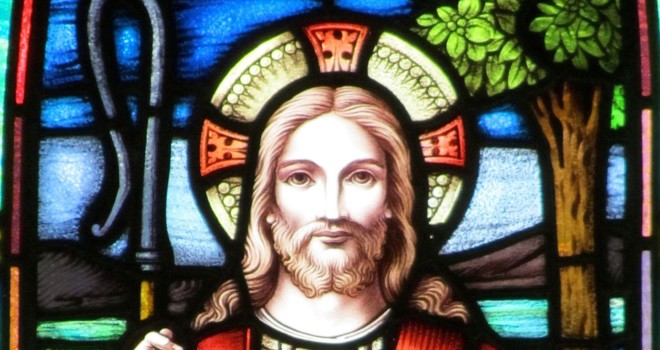The fifteenth chapter of St. Luke’s Gospel begins with Jesus describing Himself as the shepherd who leaves ninety-nine of His sheep in the wilderness and goes in search of the single lost sheep. He never abandons the single lost sheep but keeps searching for it until He finds it and brings it back home. He finds His joy only when the lost sheep returns to the fold.
St. Luke’s Gospel also ends with the story of risen Christ perfectly fulfilling this relentless shepherd image. The two disciples are discouraged, dejected, and disappointed with all that has taken place at Jerusalem. All their hopes and expectations in Christ had been crushed. So they do what we all like to do when things appear hopeless and distressing – look for something to distract us and argue with each other. The journey to Emmaus was probably to take their minds away from the painful and mysterious things that had taken place before and after the resurrection of Jesus had been announced.
The disguised risen Christ does not ignore them but goes in search of them, “Jesus Himself drew near and walked with them, but their eyes were prevented from recognizing Him.” While keeping Himself unrecognizable to them, He conversed with them, pretended not knowing at all what they were talking about, rebuked them for their “slowness of heart to believe all that was spoken of Him by the prophets,” and then pretended to be going further than their destination of Emmaus. It was ultimately at the Eucharist that He revealed Himself to them.
The risen Christ is the Shepherd-in-disguise who goes searching for each and every one of us today. He comes to us in what St. Teresa of Calcutta called the “most distressing disguise of the poorest of the poor.” This “distressing disguise” means that He comes to us in the distressing circumstances of our lives and the lives of our all our close and distant companions in this world.
St. Peter states that the first reason why Jesus will never abandon us is because He has ransomed us with His blood and we belong to Him now, “You were ransomed from your futile conduct, handed on by your ancestors, not with perishable things like silver or gold, but with the precious blood of Christ as of a spotless unblemished lamb.”(1Pet 1:18-19)
Another reason our risen Savior will never stop searching for us is because His Father never abandoned Him. King David had prophesied about the resurrection of the Christ in these words, “You will not abandon my soul to the netherworld, nor will you suffer your holy one to see corruption.”(Acts 2:27) Jesus Himself promised us, “As the Father has loved me, so do I love you.”(Jn 15:9) Just as the Father did not abandon Him in death, so too will He never abandon us but will search for us to bring us back to Him no matter how far we have strayed. In the risen Christ, we have access to that divine love that will pursue us all the days of our lives.
As we face the challenge of this COVID-19 virus, we find ourselves asking if things will ever be the same again. What will our lives, our families, our world, and our Church look like when this is over? Will we still be able to meet our expectations in life? We can find ourselves like the two disciples on the way to Emmaus with our shattered dreams and probably unmeetable expectations. Whatever the reason — personal sins and struggles, suffering, discouragement, fears about the future, brokenness, confusion, weakness, etc. — we find ourselves consciously or unconsciously drifting away from Jesus and the community of faith. His words make no impact on us anymore and His promises appear impossible.
We are not sure life will ever be the same again or if things will return to normal. We are also not sure that all our expectations will be met for ourselves, our families, our Church and our world. One thing that we do know for sure and should hold on to tenaciously: even in these distressing moments, the shepherd never abandons us but continues His search for every single one of us.
What deep and abiding joy will be ours when we begin to recognize His abiding presence with us and His search for us even in our distressing moments! The disciples’ experience in Emmaus shows us three ways in which we can begin to recognize the disguised shepherd as He searches for us.
First, we must reveal ourselves completely to Jesus Christ. The disciples opened their hearts completely to Him in their lowest moments. Without recognizing whom they were speaking with, they spoke to Him of their deepest thoughts, dreams. desires, core beliefs, expectations, and disillusionment. They spoke of how they felt about Him, His ministry, His unjust death, and the reports of His resurrection. In short, they hid nothing from Him.

The first step in recognizing Christ with us in our distressing moments is to make sure that there is nothing we are hiding from Him in our interior and exterior lives.
Secondly, we must consciously invite Jesus into our lives. And we must invite Him not as a passing guest but as our Sovereign Lord, the one whom we depend upon and strive to please in all things. Jesus is always searching for each of us but He will not force Himself on us.
The fact that Jesus is the one who took, blessed, and broke the bread in Emmaus shows us that the two disciples accorded Him the due dignity and honor of the house owner in their own place. Every single one of us too must invite Him consciously as our one and only Lord, “Stay with us, Lord,”
Lastly, we must be ready to give joyful witness to others about Him finding us in our dark moments. The same disciples who fled Jerusalem in fear and discouragement at daytime returned with boldness at the middle of the night to strengthen the witness of others in community after they encountered and recognized Him in the Eucharist, “The two recounted how He was made known to them in the breaking of the bread.” We begin to recognize Jesus searching for us when we too share with others how He has found us and brought us back to Him.
My dear brothers and sisters in Christ, how aware are we that we can find joy and peace in these distressing moments? Yes, we can; but this joy cannot come from this world or from ourselves. Our joy is only the echo in our hearts of the joy in the heart of the Shepherd-in-disguise as He rejoices over his one lost sheep that He has found, “Rejoice with me for I have found my sheep that was lost.”(Lk 15:6) This deep inner joy, a joy that “will not be taken from us,”(Jn 16:22) is ours only when we hide nothing from Him, invite Him into our lives and receive Him as our Lord, and give witness to His Lordship in our lives before others.
Glory to Jesus!!! Honor to Mary!!!
✠
Image by Stephen Muir from Pixabay












